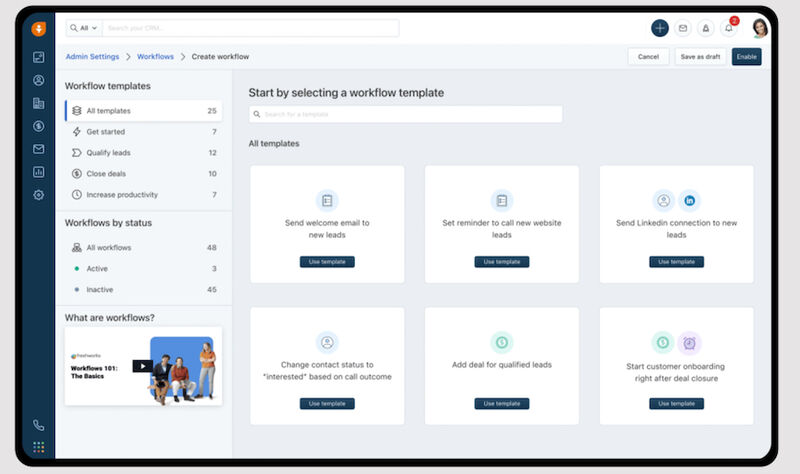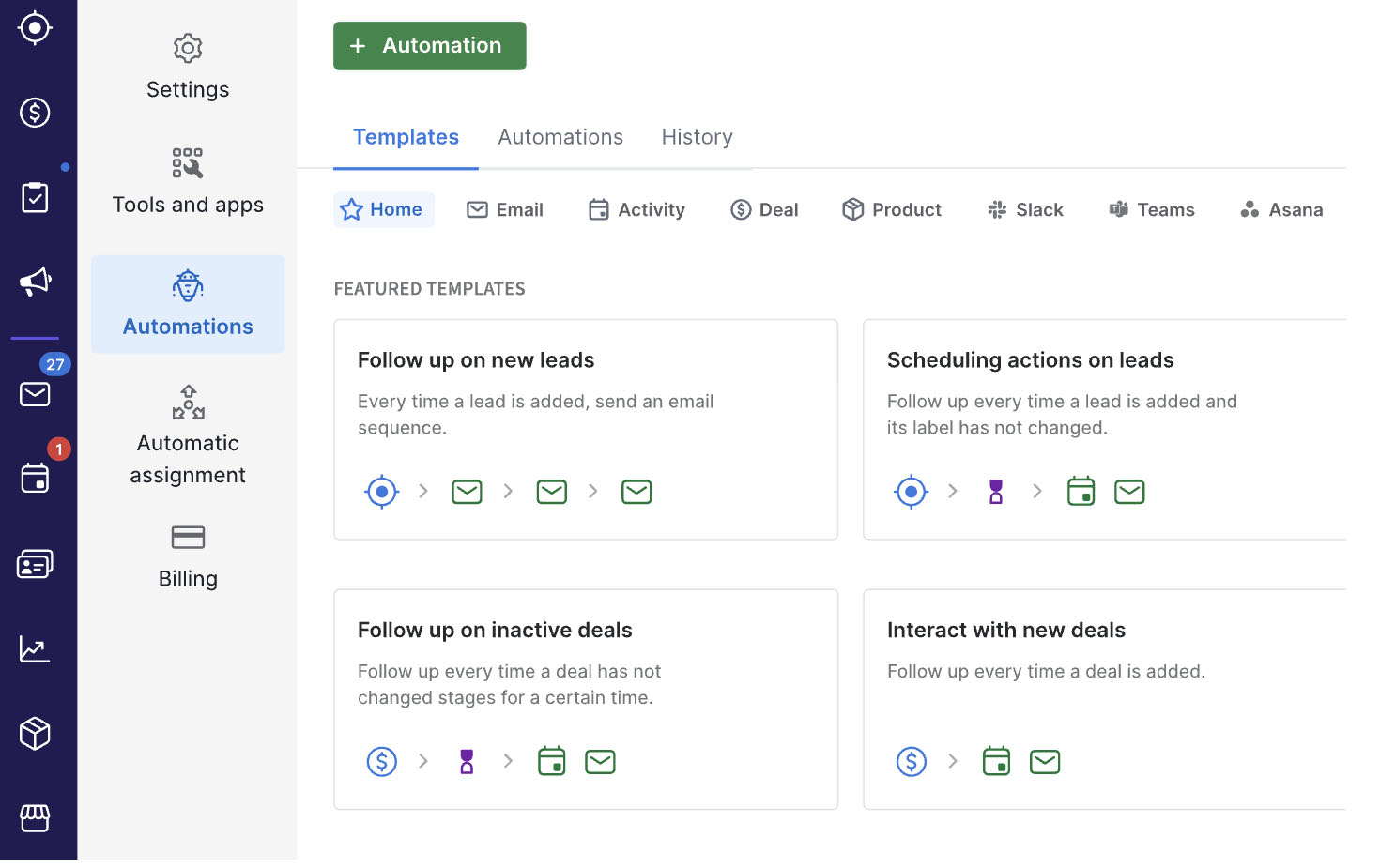Customer relationship management (CRM) software, when used correctly, does more than help you manage relationships with your customers. It’s useful when organizing and running marketing campaigns, creating detailed reports, and even boosting sales. Follow our CRM tips and tricks to help your team make the most of your chosen platform, improve the overall customer experience, and drive profitability even further.
1. Automate Menial or Redundant Processes
One of the primary purposes of CRM software is to automate menial or redundant processes. This is one of the CRM tips and tricks that let you free up your resources—and your team members in particular—for use elsewhere. Most CRM software is capable of automating many different processes in the sales cycle, including the following:
- Upselling new customers
- Moving customers to new stages within the sales pipeline
- Sending follow-up emails after a new user registration or purchase
- Offering personalized discounts for additional products or services
- Collecting feedback through customer surveys
- Onboarding and training new sales representatives
Many other processes can be automated through CRM software, too. Freshsales and Pipedrive, for instance, provide users with workflow templates for automating lead communications and deal follow-ups. Refer to your CRM’s documentation or customer support team for more information and CRM software tips that apply specifically to your chosen platform.
2. Train Your Staff Members
For small businesses, 32% of users find their lack of technical expertise to be the biggest hindrance to proper CRM implementation. While automation can help you take care of the necessary onboarding documentation for new hires, they still need to understand CRM software and how to use it effectively. Moreover, they need to be aware of the nuances associated with your chosen CRM software.
Depending on their experience, some new hires might have used your chosen CRM platform in previous roles. Other times, sales representatives who are new to the field might not have any prior experience with CRM software. In cases like this, you’ll have no choice but to provide them with the necessary CRM team training.
3. Segment Your Customer Base
Every customer is different. They all have their own needs and motivations, and they all respond differently to upselling and cross-selling tactics, promotional campaigns, and sales presentations. That’s exactly where customer segmentation comes into play. While this is one of the most common tips for CRM, the entire segmentation process is made even more efficient when completed through your chosen CRM platform.
Segmenting your customers in this manner is beneficial in a variety of ways. In some cases, it can help you decide on future products or services. Customer segmentation is also useful when designing marketing campaigns, as seen in the example from HubSpot CRM below. It can even help you gain a deeper understanding of your customer base as a whole.
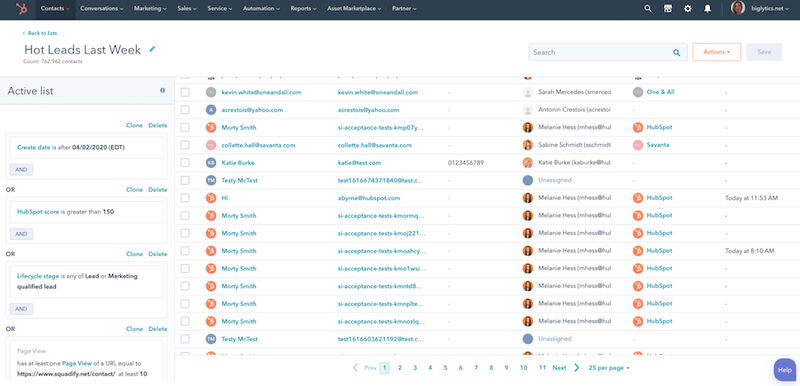
HubSpot CRM’s time-based lead segmentation for content marketing (Source: HubSpot)
4. Nurture Your Leads
Manually nurturing your leads can be a cumbersome and time-consuming task. Thankfully, most modern CRMs offer several different methods to automate these tasks, including:
- Precision targeting automatically filters out junk leads
- Lead scoring can be used to automatically take action when a new lead reaches a certain threshold
- Telephony services are highly useful when trying to contact individual customers and provide a more personalized approach
- Mobile push notifications help you maintain contact with leads over the course of time
While the act of nurturing leads can be complicated, especially for novice sales reps, most CRM solutions provide some sort of automation to help drive the process forward. For example, Zoho CRM makes it easy for users to nurture leads through omnichannel communication. This means that you can interact with customers via email, social media, telephone, and live chat from a single platform.
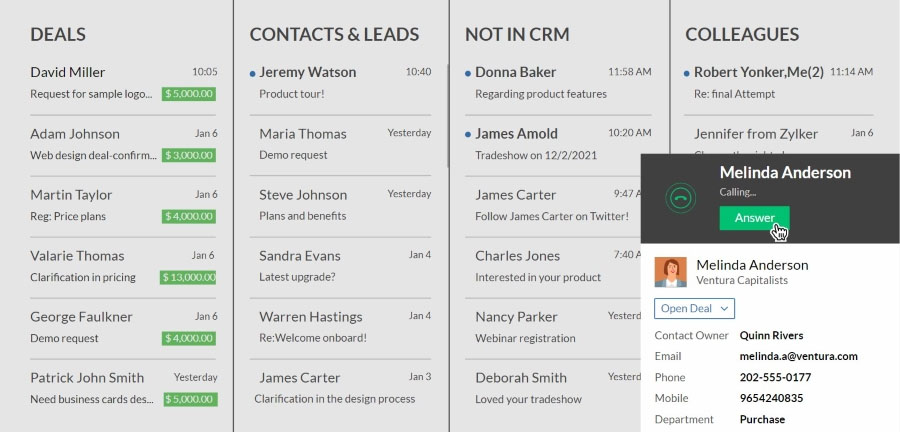
Zoho CRM’s omnichannel communication telephony integration (Source: Zoho CRM)
5. Emphasize Customer Retention
Improving your customer retention rates will help increase the lifetime value (LTV) of your customers, which increases profitability even further. You’ll be able to reduce your marketing costs since your previous customers are already aware of your products or services, and it will be much easier to sell new products and services to customers that you’ve already dealt with in the past.
Customer retention can also help boost sales in numerous ways. For instance, Smile.io found that 35% of the revenue of small ecommerce businesses comes from the top 5% of their loyal customers. While this certainly isn’t guaranteed in every scenario, it just goes to show how a minor increase in retention can lead to significant profits down the road.
6. Use Third-Party Integrations
Is your sales team currently active on Slack? Maybe they use Gmail to communicate via email or Dropbox to share files? If so, you’ll want to look for a solution that offers a wide range of CRM integrations for applications that your team is already using. While some CRMs offer their own communication and file-sharing platforms, these are rarely as reliable as standalone software systems.
Browsing the third-party integrations that are available for your chosen CRM platform can even present you with new software options that you’ve never even considered. Some CRM systems like HubSpot CRM offer hundreds of integrations, so it’s worth the time to peruse your options—you never know what you may find.
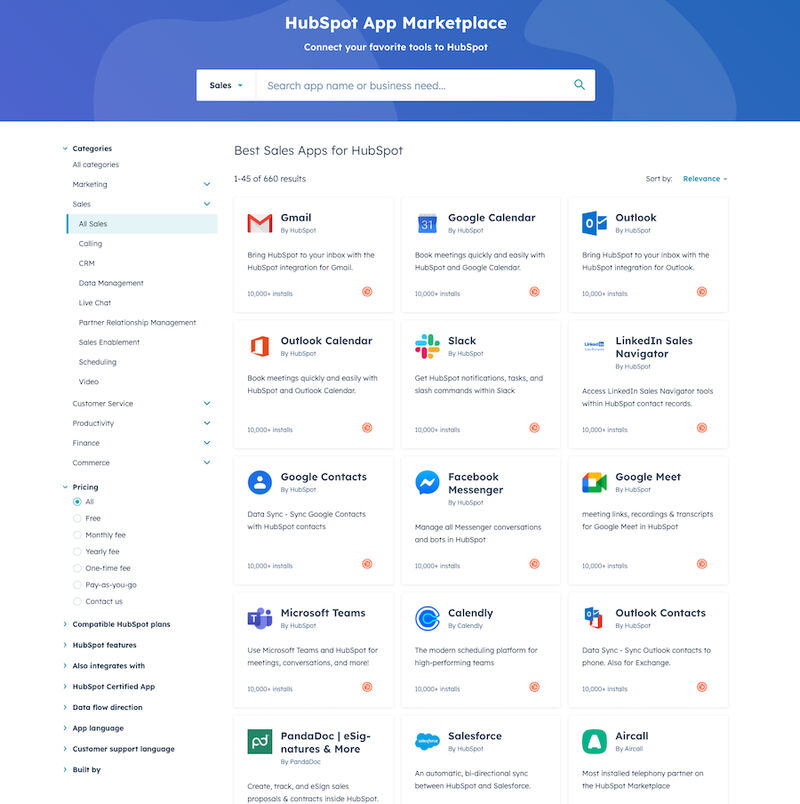
HubSpot CRM’s featured sales app integrations (Source: HubSpot App Marketplace)
7. Provide Personalized Services
Providing personalized services is one of the top tips for CRM. Customers want to feel like your communications are specifically meant for them, and many take comfort in knowing that their needs are being looked after. Instead of a one-size-fits-all approach, these customers want a service that was curated specifically for them. Thankfully, modern CRM solutions keep track of purchase histories, prior communications, and individual preferences.
Capsule CRM, for example, has an AI-powered content assistant that recommends sales email content based on contact records. This helps your staff provide personalized product recommendations, address specific issues, and use their preferred methods of communication. All of these elements make your customers feel more comfortable with your product or service, which leads to increased profitability through repeat business and referrals.
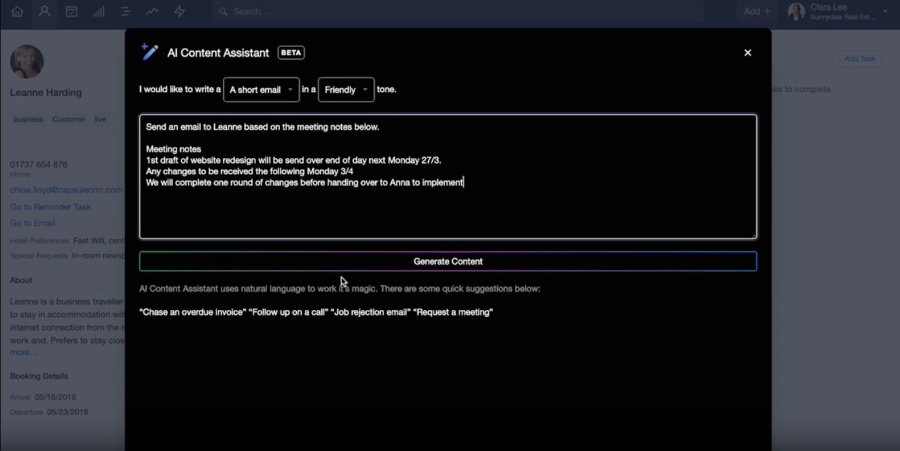
Capsule CRM’s AI-powered sales email content assistant (Source: Capsule CRM)
8. Research Your Competition
Researching your competition can help you better understand the needs of customers. By analyzing your competitors’ actions—including what they do and what they do not provide—you can identify your potential gaps, bottlenecks, or shortcomings. These CRM tips and tricks can later be used in advertising and marketing campaigns to help attract new customers to your business and increase sales even further.
Don’t be afraid to research your competitors. Understanding how other companies in your industry—or even other industries—use CRM platforms can go a long way in informing your own decisions regarding features, functionality, and integrations.
9. Monitor Trends and Identify Patterns
Many of today’s CRM platforms have integrated AI tools that are useful in monitoring consumer trends and identifying patterns. Since all of your sales data are contained within the CRM’s databases, it’s easy to retrieve this information and make comparisons as needed. Plus, platforms like Pipedrive leverage predictive analytics to identify sales patterns, trends, and insights, as well as to forecast sales.
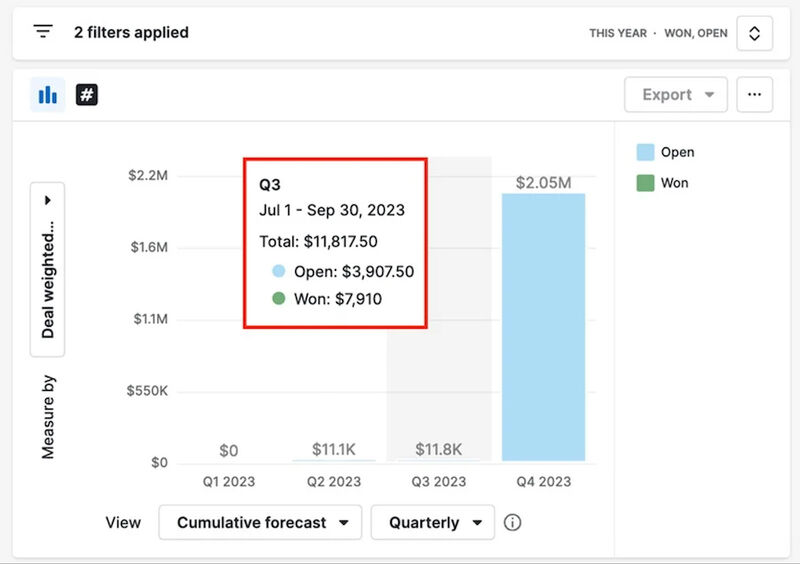
Pipedrive’s revenue forecasting (Source: Pipedrive)
When a customer is more likely to make a purchase during a certain month, for example, you can use your CRM to automatically initiate contact when the time is right. If customers tend to make purchases when your products or services go on sale, your CRM can automatically notify them before each sale begins. Using your CRM to identify trends and patterns like these will help you cater to individual customer needs without disrupting your entire business model.
10. Collect Customer Feedback
Finally, don’t forget to collect customer feedback on a regular basis. Brief customer surveys like the example below are among the most effective methods of collecting feedback—just make sure to act on it. Customers who feel like their comments and suggestions are being ignored aren’t likely to provide their feedback in the future. That said, it’s important to let them know that their voices are being heard—even if their suggestions aren’t always implemented.
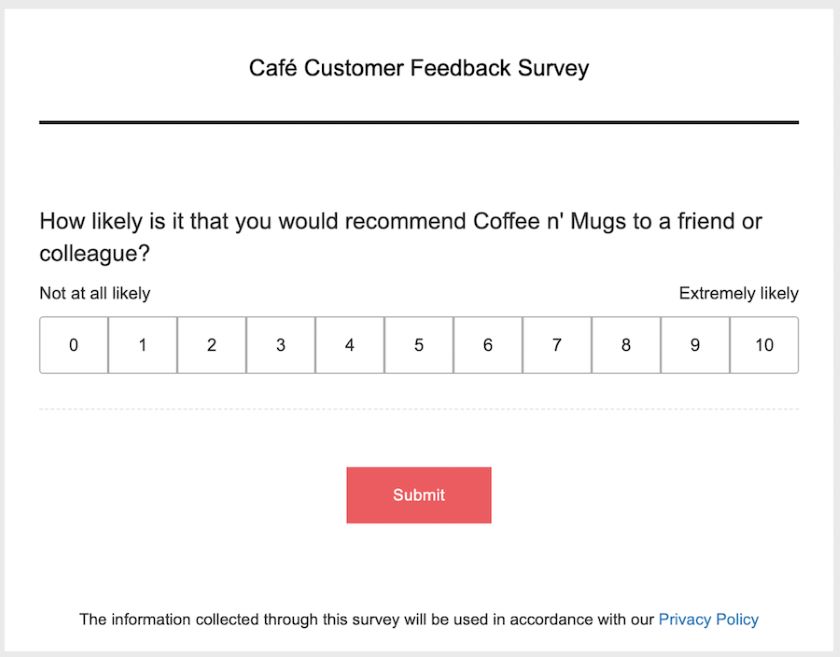
Zoho’s Net Promoter Score question sample (Source: Zoho)
Frequently Asked Questions (FAQs)
The exact costs of modern CRMs vary greatly from vendor to vendor. Most platforms offer a free trial, while others offer freemium options with restrictions on features and user limits. Entry-level CRM plans cost an average of $23 per user, monthly. Higher-tier plans with more advanced features could range from $45 to $74 per user, monthly. Other factors that affect CRM pricing include additional costs for onboarding, implementation, premium support, and add-on features.
The 4 R’s of CRM are Remember, Recount, Refer, and Return. These values help your entire team focus on improving customer experience by making it as memorable as possible so that they can refer it to their friends. When the first three of the 4 R’s are met, customers are likely to return to your business in the future. The 4 R’s are a great way to boost sales while strengthening customer satisfaction and retention on a long-term basis.
The 3 C’s of CRM are crucial, correct, and consistent. These terms describe the type of data that should be stored in your CRM. First, all of the data you collect should be crucial to your bottom line, so there is no room for unnecessary data. Second, the data should be correct, complete, and up-to-date by every measurable standard. Third, you should establish standards for data collection and reporting to maintain consistency across all teams and departments.
Bottom Line
While most CRM platforms do provide a great deal of automation, they still require a team of experts to fill in the gaps. Marketing specialists are still needed to plan and coordinate advertisements, sales representatives still play a vital role in finalizing sales, and support staff are still necessary to answer questions and provide technical support. When backed by a team of experts, however, modern CRM platforms can be used to boost sales to all-new heights.
